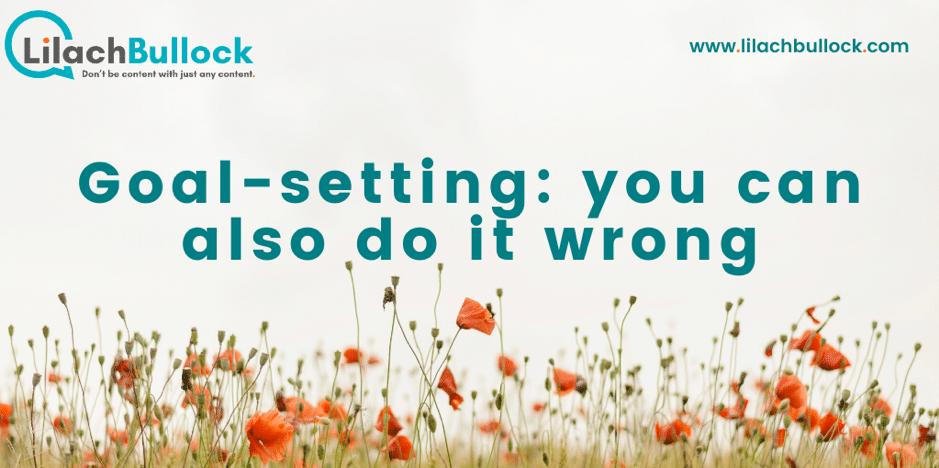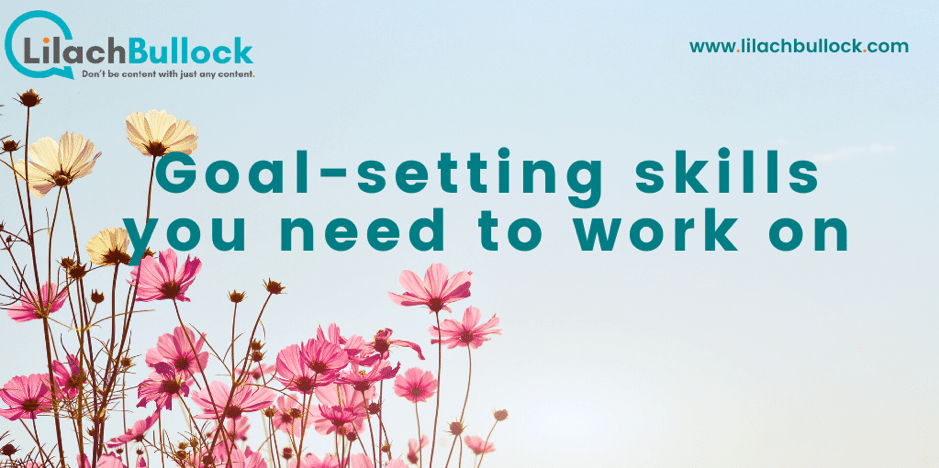Follow Lilach
Goal-setting starter kit: how to set personal goals and actually achieve them
Goal-setting sounds like such an easy concept, doesn’t it? You set yourself a goal and you try your best to achieve it.
But the truth is, it’s so much more complex than that. Because, after all, it’s not just about setting goals for yourself; it’s about setting good goals that can help you achieve what you need and want, as well as setting goals that you can actually achieve.
So, if you want to be more successful, whether in your personal or professional life, you need to learn how to set goals and achieve them in a timely and satisfying way.
In this goal-setting starter kit, I’ll show you everything you need to know about how to set personal goals for yourself and actually achieve them.
You’ll learn what goal-setting is and why it’s such an important tool, as well the key principles behind successful goal-setting, the skills you need to be successful and what not to do in order to reach your goals.
What is goal-setting and why is it so important?

For many people, setting goals for themselves is simple and something they do naturally: they think about what they want to achieve, whether it’s becoming an entrepreneur or getting a new career or reaching that dream weight.
However, that’s actually closer to day-dreaming than goal-setting.
A proper goal – or objective – is one that gives you a clear focus and ideally, also has a very clear timeline and deadline.
Basically, it’s the difference between setting a goal like “I want to be 20 pounds lighter” versus “by this evening, I will throw away all the snacks and junk food in my house.”
But why exactly is goal-setting so important from a personal standpoint? Why should you be setting goals for yourself consistently?
For one thing, there’s the obvious: it gives you the focus to actually achieve your dreams.
But there are a lot of “hidden” positive effects of goal-setting that you probably never thought about.
In fact, studies show that goal-setting can influence our lives in numerous ways:
- In a work setting, goals have been proven to increase motivation and commitment
- The more difficult a goal is, the more intense and powerful is our feeling of success when we achieve that goal
- Achieving goals can help increase our self-confidence and self-belief which in turn will help you become more successful in all areas of your life (there really is nothing as powerful as confidence in our abilities to help you succeed!)
- By setting goals, we plan for the future in a positive way, which can actually improve our overall well-being
In other words, goal-setting can help you become happier, more relaxed and more successful. It can improve your mindset, your anxiety, your optimism and your focus.
Which is why it’s so important to learn how to set quality goals for yourself so that you not only achieve your objectives, but you also achieve all the positive effects mentioned just before: better mindset, more positivity and optimism, more self-confidence and ultimately, increased happiness.
Goal-setting: key principles to help you get started

In their book, A Theory of Goal Setting & Task Performance, authors Edwin A. Locke and Gary P. Latham put together the 5 most import principles of goal setting:
- Commitment: i.e. attaching yourself to this goal and being determined to achieve it, come what may
- Clarity: being very clear about what this goal means, can help you reach it: make sure you’re very clear about what you want to achieve and when so that you know exactly what you need to do in order to achieve it. Basically, it’s just like the weight loss example I gave earlier; don’t keep it vague and say your goal is to lose weight, but rather say how much weight you want to lose, by when and how you’re going to get there
- Challenging: your goals need to be challenging – but they also need to be attainable at the same time. Because of the way our mind works, a challenging but attainable goal can have a hugely positive effect on us, increasing out satisfaction, success and confidence whereas when we set a simple, easy-to-achieve goal and we achieve it, the effect of our success won’t be nearly as strong. It’s also important to point out the importance of setting attainable goals, even though they might be challenging; that’s because if you can’t actually achieve that goal – in many cases, for reasons outside your control – that will help a negative effect on your psyche: instead of feeling motivated and confident in your abilities, you could feel like you’re failing and like you’re never going to achieve what you want. And when you feel that way, your actions will reflect it too
- Complexity: in other words, your goals need to be complex – but not overly so, for the same reason as the one just above. When you set your goal, make sure it’s not too complex and that your timeline allows for enough time to get all of your tasks done
- Feedback: last but not least, is feedback. Studies found that goal-setting is more effective when we get immediate feedback upon completion of that goal. Basically, when you get positive and immediate feedback upon completing a goal, you’ll feel more confident and more motivated to take on the next goal – and even make it more challenging for yourself. Feedback doesn’t have to come from outside sources either, which is important when setting personal goals. Rather, you can establish from the start what the successful completion of that goal looks like and what it means for you in the big picture, so that you can essentially give yourself feedback
Goal-setting: you can also do it wrong (aka what not to do when setting personal goals for yourself)

I’m reluctant to say that there are any disadvantages to setting personal goals for yourself because, well… there aren’t, really; rather, it’s a case of setting the wrong goals – or not setting them correctly.
As you’ve seen just before this section, there are numerous principles behind “correct” goal-setting and sometimes, when you don’t follow these principles, your goals might just have the opposite effect than what you were hoping for: less confidence and more stress and anxiety.
That’s why, when setting personal goals for yourself, you should really take your time to ensure you’re setting them correctly.
Here’s what to avoid:
- Using negative consequences as a result of failure: it might be tempting to think that facing clear consequences will make you more productive and more willing to do the work involved in achieving your goal but the truth is that for most people that simply isn’t the case. When you’re motivated by negative consequences what this will actually do is fill you with stress and anxiety which will make it much more difficult to achieve that goal – or even feel good about it once you’ve achieved it. So, not only does it decrease the chances of goal completion but even if you do achieve your goal, you might not be as pleased or as fulfilled about it as you should. Instead, try to offer yourself positive rewards and reinforcements to motivate you to work towards your goal in a positive way and so that you’ll be excited to start working towards your next goal!
- Being ambiguous with your goal-setting: be as clear as possible about what you want to achieve and when you want to achieve it. If you’re not clear about what you want to achieve, then you’re not going to get it – it’s as simple as that. And this is especially important when setting a very complex goal – the more complex it is, the clearer you need to be about it
- Setting overly complex and challenging goals: these goals will only make you feel badly about yourself instead of helping you and motivating you. As I mentioned earlier, it’s important to challenge yourself when you set a personal goal, but don’t overdo it as that will have the opposite effect
- Setting conflicting goals: you’re not limited to one goal at a time so when you do set multiple goals for yourself, you need to make sure that they’re not conflicting in any way because your overall performance will probably have to suffer as a result
- Setting unattainable goals: there simply is no point in setting complex and challenging goals that you simply don’t have the skillset for. All this will do (realistically speaking) is demotivate you, make you feel inadequate and cause stress and anxiety. So, if you really want to achieve something that you (realistically) can’t, start by setting smaller goals first that will help you develop the skills and knowledge you need to achieve that challenging objective – and then move on to the more complex goals you want
Goal-setting skills: what skills you need to work on to achieve your personal goals

If you want to be as successful as possible, especially if you’re not very self-confident or have had negative experiences along the way with goal-setting, then you should work on certain essential skills that can help you achieve your goals:
Time management skills
Be honest with yourself: how good are your time management skills? The truth is, there’s always room for improvement and not just when it comes to goal-setting, but throughout your entire life.
Having good time management skills means you’ll be more productive, you’ll have more time to do both your work and the things you enjoy and you’ll feel more accomplished and happier with your life.
From a goal-setting point of view, good time management skills mean that you’ll not only know how to properly set a timeline and deadline to reach your goals, but you’ll also know how to plan your time to have enough to complete your goal by your deadline.
To improve your time management skills, start by auditing your time to see exactly how you spend it. To do so, you can easily use a time tracking tool – it’s free and very easy to set up.
Then, once you have a better idea of how you spend your time, you can start optimizing it and working on your time management skills by:
- Learning how much different things take you to do
- Discovering which tasks take you too long to do and can be either cut down or outsourced
- Discovering when and why you’re procrastinating and identifying the best ways to limit procrastinating
Additionally, you should also work on identifying and removing distractions when you work on your tasks and goals: quiet down your notifications, stop checking your email and social media and remove any other distractions that are keeping you from your work or your focus.
Planning skills
Planning is another essential skill for good goal-setting and of course, it’s especially important the more complex and challenging a goal is.
I’ve noticed this with a lot of entrepreneurs and business owners; they often do but they rarely plan.
And that’s a problem because without a plan, you’ll lose sight of important aspects, you’ll lose time and consequently, you won’t be able to achieve all of your goals as intended.
So, when you set a goal for yourself, take the time to plan it out properly and in detail.
It might feel like you’re losing time instead of actually working towards your goal when in fact, planning will help you be more focused and allow you to work through all the steps correctly.
With proper planning, you’ll be able to:
- Prioritize the most important tasks
- Set a clear and realistic timeline that will allow you to reach your goal by its deadline
- Make sure you’re not missing any important steps
- See if there’s anything you can outsource to increase your productivity and allow you to spend more time on the tasks that only you can do (especially important for entrepreneurs!)
Mindset and motivation skills
Our minds are such powerful things that can easily make or break us. Without the proper motivation and without a positive mindset, achieving goals is almost impossible.
After all, if you’re not motivated to achieve your goal, why would you ever achieve it?
In other words, don’t set goals for yourself if you don’t have the confidence and motivation to achieve them. First, work on your mindset – and then set your goals and start working on them.
So, how do you achieve a better mindset and find the motivation you need to reach your goals? Here are a few very simple and effective tips to help:
- Try to remove negativity from your life as much as possible and instead surround yourself with positive thinkers and positive things; likewise, work on your own positivity and try to see the positive sides of things instead of immediately focusing on the negative
- Find something that drives you: for some, it’s their families and their kids, for others it’s competition and for others, it’s simply competition with themselves. Try to find out what drives you and focus on that
- Start your days right: think about what you’re thankful for, what makes you happy and content, what drives you – from the moment you open your eyes (Pro tip: do this when you wake up instead of immediately reaching for your phone!)
- Focus on the benefits: think about what achieving a personal goal means for you and how it can change your life in a positive way
- Try to motivate yourself instead of relying on outside motivation: you won’t always have others to applaud your efforts or motivate you to be and do better. Because of this, it’s important to find ways to motivate yourself instead of relying on others – it’s almost like having a superpower!
Commitment skills
It’s so easy to start something – but finishing it, though? Much more difficult. That’s why you need to be as committed as possible to your goals.
So, work on your mindset and work on goals that are personal and important to you – and, of course goals that you can actually achieve. Don’t start something that you’re not sure about – you’ll just leave it unfinished which will demotivate you and not make you want to start any new goals in the future.
Flexibility skills
Flexibility is a very important skills when it comes to goal-setting.
Setting a clear and concise goal for yourself and developing a plan to achieve it are great – and essential – first steps.
But the reality is, life is very unpredictable and often times, you’ll run into obstacles that you never thought about or you could encounter new information that can – and should – change your plans to achieve your goal.
Because of this, when you encounter this new information, you need to be ready to make changes as needed, while still remaining motivated and excited.
What’s more, you need to work on how you deal with any obstacles you’ll likely run into along the way and instead of feeling defeated and giving up, finding a different way to achieve what you want to achieve.
This is very closely related to your mindset, which makes it doubly important to focus your efforts on becoming stronger mentally, on becoming more self-confident and more self-motivated.
Conclusion
Goal-setting can be a very powerful thing for us, both on a personal and a professional level. It gives us hope, motivation and it gets us excited and looking forward towards the future.
However, it’s important to set goals the right way in order to increase your productivity, your success rate and your satisfaction.
Not only that, but in order to actually achieve your goals, you also need to work on yourself and your existing skills.
Use the tips outlined in this guide to set personal goals and continue improving your skills, your knowledge and getting one step closer to achieving the success you’ve always dreamed about.

Follow Lilach















